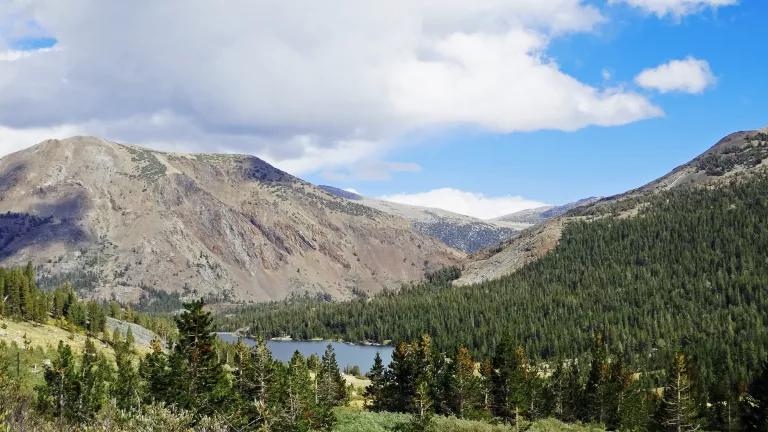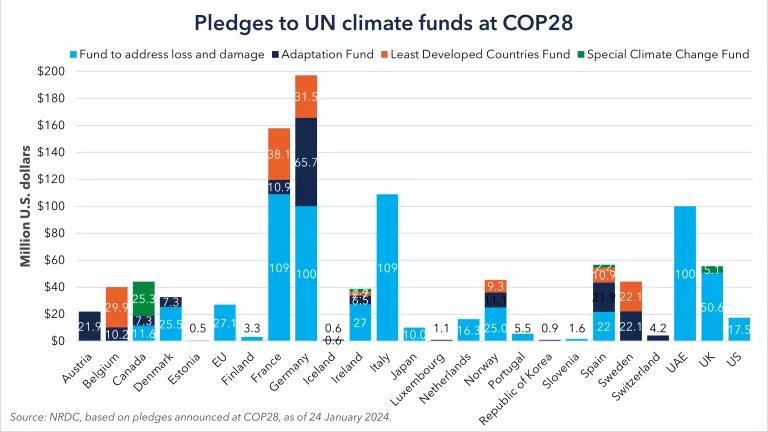
Part of NRDC's Year-End Series Reviewing 2019 Climate & Clean Energy Developments
This week, 12 states and the District of Columbia proposed a plan to cap emissions from the transportation sector and promote cleaner mobility options in the eastern U.S. Like much of the momentum on clean energy we've seen this year, it's a welcome move that needs a pedal-to-the-metal approach to make real progress toward saving our rapidly worsening climate.
The plan from the Transportation and Climate Initiative (TCI) is the latest in a series of big steps toward clean energy, and it certainly won't be the last. More states are moving ahead with strong policies aimed at cutting greenhouse gas emissions. At the same time, renewables keep getting cheaper, and federal investment in clean energy technologies so far has survived a Trump administration that loves dirty fossil fuels.
Yet as we saw from the outcome of the latest international climate talks in Madrid, leadership and progress are sorely lacking among the world's top polluters. We already know what needs to be done, rapidly scale up existing renewable, efficiency, electrification, and other zero-carbon technologies, to stem the worrying and incontrovertible climate damage now playing out in the form of deadly wildfires, floods, heat waves, and other disasters. We just need to do it—and faster.
For inspiration, look to some of the many heartening developments in clean energy in 2019. In addition to the TCI plan, which addresses a sector that now accounts for 40 percent of the region's greenhouse gas emissions, the Regional Greenhouse Gas Initiative (RGGI) is expanding with the addition of New Jersey, Virginia, and Pennsylvania. RGGI, which has helped cut member states' emissions in half over the past decade with a cap-and-invest market system, has saved residents at least $1 billion on their energy bills and contributed health benefits worth $5.7 billion.
Across the country, individual states are forging ahead with clean energy policies while Trump's federal government stagnates. New Mexico, Nevada, New York, Maine, and Washington have joined California and Hawaii in adopting goals to reach 100 percent clean energy by 2050 or sooner. Colorado this year joined ten other states in adopting California's strict zero-emission vehicle program, and we saw a wave of policies boosting energy efficiency across buildings, household appliances, and equipment. Many cities are doing their part too, with nearly 150 now committed to achieving 100 percent renewable energy—others, such as Aspen, Colorado and Burlington, Vermont, are already there.
The investment in renewable energy isn't confined to state and local governments. Companies and electric utilities are stepping up too, recognizing that clean energy simply makes good business sense, thanks to a huge decline in costs over the past decade. Over the past year and a half, nine utilities have voluntarily committed to 100 percent carbon-free electricity—that means more than 44.5 million homes and businesses are in a state or utility service area covered by such commitments. More than 220 companies also have pledged to source all renewable power.
All of this progress is great. None of it means the nation is on track to achieve the modest emissions reduction targets set as part of the Paris Agreement. U.S. emissions rose for the first time in five years last year, and the country built more natural gas plants than renewable energy facilities. In addition to the Trump administration's Paris withdrawal and its relentless attacks on regulations designed to reduce pollution and boost energy efficiency, Congress is about to pass a spending bill that fails to extend tax credits for solar panels, electric vehicles, and energy storage.
Still, the tide of actions taking place across the country reflects the reality that a majority of Americans now know global warming is happening. As the difficult-to-ignore proof stacks up in daily news headlines and in our own backyards, climate change is changing the politics of climate change. At long last, politicians are talking about it—in presidential debates, in the House, in state legislatures. It is getting harder for deniers and fossil fuel backers to wave away the problem or stall clean energy policies that also lower people's electric bills, create good jobs, and clean up the air.
The public’s growing alarm and increasing demand for action are the reasons for my optimism as we head into a year poised for more clean energy commitments and innovation. With the impacts of climate change increasingly undeniable, it’s inevitable that the people’s will and clean energy will win. The only question is will it be fast enough to avoid the worst impacts—and at the same time, build a thriving clean energy economy.


